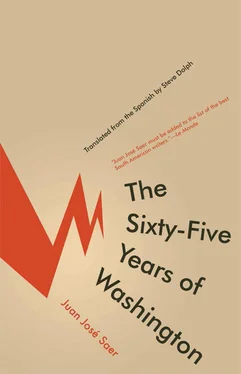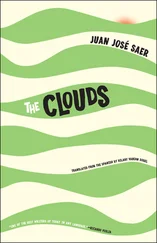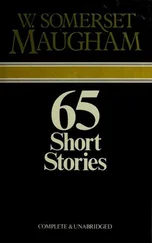Juan José Saer - The Sixty-Five Years of Washington
Здесь есть возможность читать онлайн «Juan José Saer - The Sixty-Five Years of Washington» весь текст электронной книги совершенно бесплатно (целиком полную версию без сокращений). В некоторых случаях можно слушать аудио, скачать через торрент в формате fb2 и присутствует краткое содержание. Год выпуска: 2010, Издательство: Open Letter, Жанр: Современная проза, на английском языке. Описание произведения, (предисловие) а так же отзывы посетителей доступны на портале библиотеки ЛибКат.
- Название:The Sixty-Five Years of Washington
- Автор:
- Издательство:Open Letter
- Жанр:
- Год:2010
- ISBN:нет данных
- Рейтинг книги:3 / 5. Голосов: 1
-
Избранное:Добавить в избранное
- Отзывы:
-
Ваша оценка:
- 60
- 1
- 2
- 3
- 4
- 5
The Sixty-Five Years of Washington: краткое содержание, описание и аннотация
Предлагаем к чтению аннотацию, описание, краткое содержание или предисловие (зависит от того, что написал сам автор книги «The Sixty-Five Years of Washington»). Если вы не нашли необходимую информацию о книге — напишите в комментариях, мы постараемся отыскать её.
The Sixty-Five Years of Washington — читать онлайн бесплатно полную книгу (весь текст) целиком
Ниже представлен текст книги, разбитый по страницам. Система сохранения места последней прочитанной страницы, позволяет с удобством читать онлайн бесплатно книгу «The Sixty-Five Years of Washington», без необходимости каждый раз заново искать на чём Вы остановились. Поставьте закладку, и сможете в любой момент перейти на страницу, на которой закончили чтение.
Интервал:
Закладка:
— Washington likes to draw out what he’s thinking little by little, says the Mathematician. But everything is clarified when he reaches his conclusion.
— And that was where he wanted to end up? Leto says, trying out that vague question in order to obtain a better indicator.
— Right there, says the Mathematician.
— Set in motion by, Leto says slowly, in a thoughtful tone that simulates an implicit series of rationalizations.
— No. No. Not at all. Just the opposite, says the Mathematician with a kind of energy that could be of a pedagogical order.
— Right, yes, Leto says. Just another way to put it. More elegant.
— Why say it another way when Washington said it as clearly as possible? says the Mathematician.
— That’s true, Leto says. And, disappointed, he takes a last drag from his cigarette and flicks it to the sidewalk.
Considering the issue resolved, the Mathematician says that, according to Botón, right after dinner they had given Washington his gifts: Basso, Nidia, and Barco had put them all in a big cardboard box, and Basso’s girls, before going to bed, had taken out and given them one by one to Washington, who unwrapped them slowly to everyone’s anticipation: Beatriz, a belt; the Bassos, a box of darjeeling tea; Marcos Rosemberg, a mechanical sprinkler for the garden; Cuello, a mate gourd with a silver top and base; Silvia Cohen, a book by Paul Radin; Tomatis, an album of erotic Japanese etchings from the eighteenth century; Dib had a case of wine from Salta in his car; and later on Héctor, Elisa, and Rita Fonesca brought him a super-expensive illustrated history of modern art. The rest the Mathematician doesn’t remember — ah, yes, Barco, a checked shirt of the kind Washington likes, and the twins a ham.
— A ham? Leto asks, less out of genuine surprise than out of a faked curiosity, which is aimed at distracting the Mathematician while he tries to remember, or in any case decipher from the Mathematician’s words, the clarification of the story of the mosquitos that the whole world, except him in particular, seems to understand through lateral allusions and fragmentary, cursory precisions as conclusive and decisive evidence. But the Mathematician only responds with a quick, distracted nod, concentrating on what he means to say and not disposed to letting a secondary problem, the ham the twins gave Washington, disturb his mnemonic and rhetorical efforts. The sincerity with which the Mathematician seems to consider his full comprehension of the real meaning of Washington’s words, as a result admitting him into an exclusive circle, produces ambiguous feelings in Leto, a mix of pride and guilt, as though he were slightly fraudulent, but the Mathematician, unaware of his contradictory states of mind, takes for granted his admission to a circle of people who are intelligent and well-intentioned, as they say, correctly situated in their politics and so, offering the first results of his internal elaboration, goes on: All the gifts, according to Botón, Marcos Rosemberg planned to take to Rincón Norte the next day. Washington was very happy with them. In fact, as they say, despite how mild the winter had been, as the night wore on it got increasingly colder and those who stayed outside, under the pavilion or simply out on the patio, had to cover themselves as much as possible in order to bear it, and on top of sweaters, overcoats, hats, scarves, gloves, and cloaks, the Bassos started bringing out ponchos and blankets to distribute among the guests who, sitting around the table, or coming and going from the pavilion to the house, or walking in clusters through the trees at the back, started wrapping themselves up and releasing streams of air that turned to vapor each time they opened their mouth to say something or just to breathe. According to Botón, says the Mathematician, at some point they went looking for mandarins at the back, the last of the year, from the trees where even in the morning darkness they could sense the appearance of the first shoots that signaled the end of winter, and the mandarins were so cold that biting them would hurt their teeth, until Sadi, the unionist, suggested heating them up around the last coals and ashes that were still warm, the way he did when he was a kid with oranges in a barbecue. And so they had put them in the ashes and embers for a while and had eaten them warm — and the Mathematician can’t imagine how good those mandarins must have been. I can’t imagine what that’s like. Ever since Botón told me about it Saturday on the ferry I’ve been tempted to recreate the experience . Which is satisfying to Leto because he, on the contrary, as far back as his memory goes, can remember the warm mandarins and oranges they would take from the grill on winter nights, when he spent July vacations in his grandparents’ town, and this is the first time since the Mathematician started relating the circumstances of the party that he feels ownership of one of the details of the events of that night last winter at Basso’s ranch in Colastiné, which he’s never been to and has had to piece together, as they say, from assorted images of various ranches, half real and half imagined. Like two towns on the river coast, the warm mandarin juice connects, one might say, his own life to the images evoked (if the expression fits) by the Mathematician’s words: Ah, the warm mandarins. Because they’re always last, at the end of winter they’re the sweetest. They’re so full of juice that when you warm them in the ashes they taste like honey .
The Mathematician looks at him. Like any good rationalist, he distrusts lyrical exaggerations — especially unfamiliar ones — and his look, blatantly scrutinizing, searches Leto’s face for the gravity that’s necessary to lend credibility to the description and for the indifference and absence of hesitation that would certify his rationalist certitude, which, in light of his somewhat indiscreet comparison, and conscious of having hyperbolized his description in order to amplify the importance of his experience, Leto struggles to maintain at all costs. Turning his eyes back to the street, the Mathematician seems to have concluded his inspection, with satisfactory results apparently, if Leto judges by the carefree bonhomie with which he resumes his stream of compact, well-turned phrases, at times elegant and not exempt from a kind of arch excess of precision, a certain refrigerant preciousness in the expression of emotions, and mostly ironic shades in the disdain of his assumptions. Sometimes a general dispersal, sometimes a reunion under the pavilion . They walked through the darkness covered with ponchos and blankets, holding a glass in one hand and a cigarette between the index and middle fingers of the same hand, the glow of red ends of their cigarettes growing slightly in the darkness, among the mandarins, if they took a puff. When they crossed the bands of light projecting from the ranch into the patio and between the trees, you could see the streams of whitish breath they expelled through their half-open lips. Sometimes, from somewhere in the darkness, they could hear a couple whispering, and in some cases, and despite the cold, the whispers sounded more like conclusive shudders than preliminary murmurs— all this , the Mathematician clarifies, according to Botón : branches shaking, voices, laughter and shouts that dispersed and faded in the dark, frozen air under the stars resembling pieces of ice formed yellow, or blue, or red, or green, that in the Mathematician’s imagination are sidereal chemical memories in which each color is just evidence of this or that substance or of thermal relationships where the different colors are just the consequence of varying temperatures. As he speaks, the Mathematician imagines them, lighthearted and happy while he marched around Frankfurt, sees them coming and going across the dark patio under the sky loaded, one might say, with active substance. But these are private images belonging to what is intransmissible in his representations — those apparently arbitrary and senseless images that, nevertheless, were they diagramed, would reveal more of his identity than his fingerprints or the features of his face. According to Botón , says the Mathematician, a few people sat around the table wearing blankets, scarves, hats, gloves — they smoked with the gloves on . Until at some point the cold was so unbearable that the ones who were left, because most people had already gone, were forced to move inside. The cold chased them from the patio to the house , says the Mathematician that Botón had said happened. According to Botón, they had sat around drinking mate and at some point Washington had said that certain ritual positions in tantric yoga were revolutionary. If Botón didn’t hear wrong, which is highly likely , says the Mathematician.
Читать дальшеИнтервал:
Закладка:
Похожие книги на «The Sixty-Five Years of Washington»
Представляем Вашему вниманию похожие книги на «The Sixty-Five Years of Washington» списком для выбора. Мы отобрали схожую по названию и смыслу литературу в надежде предоставить читателям больше вариантов отыскать новые, интересные, ещё непрочитанные произведения.
Обсуждение, отзывы о книге «The Sixty-Five Years of Washington» и просто собственные мнения читателей. Оставьте ваши комментарии, напишите, что Вы думаете о произведении, его смысле или главных героях. Укажите что конкретно понравилось, а что нет, и почему Вы так считаете.












